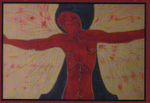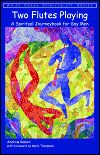Opening Words from the Editors
If you meet the Buddha in the Baths…
Dan Vera & Bo Young
Dan Vera: A few months back we heard from a writer we’d published. A somewhat well-known writer who had a change of heart — to be charitable — and no longer wanted to be known as a gay man. Although he was duplicitous in his dealings with us, taking us around the block with many tales of woe and stalkers, before he came clean and admitted the truth. The real reasons he wanted his material removed from our website was it was going to hurt his sales in Asia if he were known as a gay writer. Now this guy was looked up to as a source of “wisdom” by his readers and a “guide” for living the right life. Behind the scenes he’d made the decision that it wasn’t lucrative to his career to be known as a gay man.
Bo Young: When we asked around we heard from other people that this sort of thing has happened for years in magazine publishing. The whole point of White Crane has been that the talking circle eliminates the need for leaders. If we share our stories, we can learn from the collective wisdom of the community. As Sheldon Kopp famously advised, “If you meet the Buddha on the road, kill him.” I think I have just reached a point where I don’t buy into the whole “guru” thing anymore.
Dan: For some reason I’m thinking of “right livelihood” which is good and what we’re talking about here… how would we differentiate?
Bo: That’s a good question…because there are some people that I’m fine with and others that my bullshit detectors just go off. It’s a difficult distinction, and it gets back to the idea of discernment, which is, in one way or another, the topic we’ve been dancing around for the last four or five issues…just calling it another name, or approaching it from a different angle…like calling it “healthy spirituality.”
Dan: There are always exceptions to the rule. Last issue we spent some time discussing the need for mentors, or guides for the path. This issue, in a way, seems like a guide for what to watch out for. What sets off bullshit detectors? I mean on the one hand people got to put food on the table. We don’t have institutions that would normally take care of people doing this kind of work.
Bo: Well we do have institutions, but some of them are also simply imitations of old style, hierarchal institutions…it’s just “daddy telling you what to do” all over again…
Dan: So, maybe what we’re not crazy about is another “priestly class” of gurus?
Bo: But there seems to be this gaggle of people who see the whole “gay spirituality” movement as a career opportunity and present themselves as having all the answers, when I sincerely doubt they’re even asking the right questions. All they’ve really done is read the “canon” as it were, then they repackage it with themselves at the center, and hope to book a few author’s tours and cruises. It always comes back to Bob Barzan’s genius for me. He always used to say he thought most people had a good pamphlet in them, but the publishing business forced people to produce whole books…stretching a subject beyond it’s need and the thing writer had to say. If I get one more book that promises me “Self-Transformation for Joyful Living” I’m going to use them for fire starters!
Dan: Yeah, but combustion is never a good idea with those types of books. Because they always come clad with a glossy cover emblazoned with a soft-core smiling models. I can imagine the toxic fumes those glossy covers would give off in a fireplace. But your mentioning of cruises and retreats brings up the disturbing issues of class that are likely to come up around that kind of programming. It enforces an idea that only the wealthy or connected can have access to wisdom – that you need a spa to transcend.
Bo: Or the “nobility” of poverty. Somewhere in that scale is “the noble Indian” too, for lack of a better term. Or all things Indian are, by definition, holier, Earthier, more spiritual.
Dan: Yes. It’s faddish almost. A good teacher of mine, I don’t want to name drop here, used to joke that in Indian communities they always qualified Indian time in terms of “B.C.” eras. “Before Columbus,” “Before Custer” or “Before Costner.” Many Indian scholars see new age interest in Indian Religions as a form of self-colonization on the part of Indian tribes in which their rituals become a spectacle or observed event, completely changing the communal power.
Bo: And again…we come full circle to discernment…how do we know when to say “enough”? The thing that keeps coming to me is our “Be Your Own Guru” t-shirt. “Snake oil” and “charlatan” comes down discernment…how to separate wheat from chaff, gold from fools gold? — or fools from their gold?
Dan: There’s a lot of pyrite in them thar hills. That brings up another bullshit warning. Beware a teacher who claims infallibility. I love that old line from the Kena Upanishad: “If you believe you know, you do not know. If you believe you do not know, you know.” It doesn’t mean there aren’t basic understandings, but absolutes are very tricky.
Bo: Sure…and there’s another dynamic of seeing something or someone who once was a teacher for you but is no longer…someone is still going to need that kind of teaching even if YOU don’t. “Been there, done that” doesn’t necessarily mean it no longer has value.
Dan: Agreed. It once held value but doesn’t anymore. But there are some who never break from that. They never seem to move beyond that disciple stage or even know it’s a possibility.
Bo: There are people who never leave therapy, either…and there’s a connection. In therapy there’s the phenomenon called transference and reverse transference (from the therapist to the patient). It’s no accident that some of our most loyal readers are therapists. Doing your own psychological work is an inherent part of spiritual growth. So there’s a natural bent towards “self-help” work and therapists and “those from whom all wisdom flows” and I guess my own interest is where does that process end and when do we stand up and say “you know, I think I have the tools I need to make my own mind up”…that’s discernment. When do we start looking inside ourselves for the answers instead of outside? I’m tired of being told that the answers are “out there” and that we need some intermediary to attain it…one of the first things I ever wrote was my own declaration of what I was seeking and right at the top of the list was I was tired (as a recovering Roman Catholic) of intermediaries interpreting for me. I was willing to sit in student/teacher relationship, but only if I knew there was going to be an end to it and at some point knowledge and such would be passed along to me.
Dan: I think another thing to always watch for is our own penchant for placing teachers on pedestals. We forget their fallibility. And it’s not useful. We don’t need more hierarchies. We’re not maturing. We’re giving the authority, again, to someone else.
Bo: When I was trained as a therapist, one teacher suggested that therapy was like a boat that people take to get “the other shore.” But the problem was, most people never got out of the boat! And it’s the same with spiritual gurus and teachers. People either get lost in the myth or the myth-teller, it seems, and forget that it’s meant to be poetry and metaphor trying to explain something that is, in the end, unexplainable. It’s Dorothy and the Wizard. Eventually someone has to pull the curtain and see who’s pulling the strings. Learning that those imperfections — including my own — were part of the deal. That’s something I think people fall prey to…this idea that we can BE perfected.
Dan: When you say people fall prey, do you mean searchers or leaders? Or both? I’m guessing searchers because that’s the belief that can be preyed upon by a bad guru. A “buru.” I think it’s the role of the mentor to be constantly checking his altitude. When you sense you’re floating too high, you need to step off the pedestal you’re being placed on. “Uh oh, the air is thinning. Crap. They’re doing it again.” [teacher steps down]
Bo: And I still think that’s putting the responsibility on the outside. At some point each of us has to know when to say “enough.” When to know when the learning has run its course and now it’s time to move on. Which is not to say we don’t value teaching. I just have reached a point where I think the ultimate authority has to be YOU.
Dan: There’s that great story in the Christian Gospels about Jesus washing his disciples’ feet, which is enormously revolutionary.
Bo: Yes. That’s certainly a Christian image that sticks with me. The humility. You don’t see a whole hell of a lot of humility out there. It’s usually “I have all the answers.” Or I have the answers you need, at least…follow me.
Dan: Another warning sign is beware a guru who’s an angel in public and a mean S.O.B. in private. I’m sure we could tell stories. For me it means that one’s public and private life shouldn’t be a Jekyll and Hyde production.
Bo: And doesn’t that seem like it should go without saying almost?
Dan: Sure, but then you run into so many “private bastard/public angel” that you think that’s normal.
Bo: That’s why I love the idea of the “secret mentor” that Chris Bartlett writes about in this issue. The Jewish tradition has levels of mitzvahs where you do good deeds, with varying levels of public knowledge or awareness about it…ranging from everyone knowing you’ve done it to it being done in complete anonymity. Eric Rofes would talk about this…being a “secret mentor”…he would see someone who he believed was doing good work or had potential to do good work and he would support them. But he would do it without letting them know he was doing it…sending books, articles, making connections for them.
Dan: Look, I think what we’re talking about is another refraction of the last issue, which was all about mentors and maturity and transmitting gay culture. We’re all searching out and trying to make sense of this “one wild and precious life” as Mary Oliver puts it. We find guides, fellow travelers, who can point us in the right direction. Some of them screw us over and some of them honor us with their grace.
Bo: Occasionally, the screwing over is as valuable as the grace. The “screwing over” is the grace.
Dan: Well, yeah. So, we do our own work knowing that we’re going to be called on to guide others after us. So this issue is as much a handbook for future guides as it is a warning to searchers.
This is just an excerpt from this issue of White Crane. We are reader-supported and need you to subscribe to keep this conversation going. So to read more from this wonderful issue SUBSCRIBE to White Crane. Thanks!
 ane’s edition of Mark Thompson’s Gay Spirit: Myth & Meaning has been nominated for the Premio Luso Espanol de Arte Y Cultura (The Spanish Luso Prize for Art & Culture.) The prize includes a cash award of 75,000 Euros and is presented by the Ministries of Culture of both Spain and Portugal as a way of strengthening artistic and cultural relations between the two countries.
ane’s edition of Mark Thompson’s Gay Spirit: Myth & Meaning has been nominated for the Premio Luso Espanol de Arte Y Cultura (The Spanish Luso Prize for Art & Culture.) The prize includes a cash award of 75,000 Euros and is presented by the Ministries of Culture of both Spain and Portugal as a way of strengthening artistic and cultural relations between the two countries. This is one of Benard’s recent works pictured here, entitled On Fire.
This is one of Benard’s recent works pictured here, entitled On Fire. 






